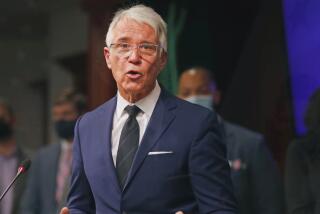Attorney in AIDS-Assault Case Argues for Preliminary Hearing
- Share via
The defense attorney in an AIDS-assault case argued Wednesday before the 2nd District Court of Appeal that a Santa Barbara man has a constitutional right to hear evidence against him.
However, Vincent J. O’Neill Jr., a Ventura County deputy district attorney, argued that the county grand jury’s indictment of David Scott Crother, 45, was meant to eliminate the need for a preliminary hearing.
The Crother case should proceed directly to trial, O’Neill told the appellate court’s 6th Division, which met Wednesday in Santa Barbara.
Crother was indicted in January on 15 counts of assault with a deadly weapon--one for each sexual liaison that he allegedly had with an unidentified Ventura County woman between September, 1988, and August, 1989.
The woman and the child Crother allegedly fathered have tested positive for the AIDS virus, prosecutors say.
At the center of Wednesday’s court dispute was Proposition 115, the Crime Victims Justice Reform Initiative, which took effect June 6, 1990.
One provision of that law, meant to streamline court proceedings, allows prosecutors to bring defendants to trial through secret grand jury proceedings, rather than through preliminary hearings in which defendants can cross-examine their accusers.
The appeals court ruled earlier this spring that a Ventura County Superior Court judge was correct to grant Crother a preliminary hearing after his indictment because the alleged assaults took place before the voters passed Proposition 115.
But on April 1, 1991, the state Supreme Court ruled that court procedures outlined in Proposition 115 can apply to crimes committed before it was passed.
In light of that decision, the high court ordered the appeal court to vacate its order of a preliminary hearing for Crother and to hear new arguments from O’Neill and defense attorney Robert M. Sanger.
Sanger argued Wednesday that Proposition 115 violates Crother’s state and federal constitutional rights to equal protection, specifically his right to hear the evidence against him.
“(You) are here to decide this on a legal basis and not simply agree with what (prosecutors) have sold the public,” Sanger told the appellate judges, referring to the fact that much of Proposition 115 was written by prosecutors.
“Equal protection is still a right that the people have in this state and can be determined independently by the judges in this state,” Sanger said.
However, O’Neill argued that the state Supreme Court ruling on Proposition 115 makes it plain that Crother can be sent directly to trial without a preliminary hearing.
O’Neill said that both Proposition 115 and the longstanding right to equal protection should be given equal weight as constitutional mandates.
But he argued that Proposition 115 was meant to overlap the Constitution to allow indicted defendants to be tried without preliminary hearings.
“You can’t use one constitutional provision to hold another provision unconstitutional,” he said.
Proposition 115 added a provision to the California Constitution which said, in part, “If a felony is prosecuted by indictment, there shall be no post-indictment preliminary hearing.”
The state Supreme Court has not yet ruled on the legality of that provision.
Prosecutors have said they want Crother to go to trial without a preliminary hearing so they can reduce the amount of time the alleged victim would have to spend testifying in open court.
Crother’s case is the first assault prosecution in California of someone for allegedly spreading the AIDS virus through sex. He remains free on $1,000 bail.
More to Read
Sign up for Essential California
The most important California stories and recommendations in your inbox every morning.
You may occasionally receive promotional content from the Los Angeles Times.










